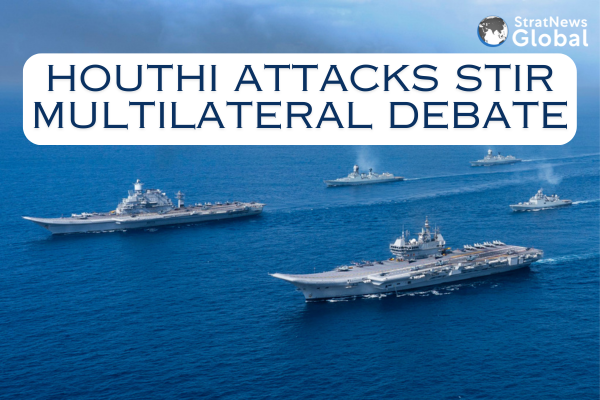Houthi Attacks on shipping in the Red Sea by Yemen’s Houthis and retaliation by US and allied forces have come as a “double whammy” for India, says Capt. Sarbjeet Singh Parmar, formerly of the Indian Navy and a maritime security specialist. It has caused ships bound for Indian ports to reroute around the Cape of Good Hope forcing them to spend more on fuel. They are also being preyed on by pirates operating off the West African coast. Result: India could lose as much as $30 billion of exports this year, a 6.7% drop from the last year, because of this “double whammy”.
“We are actually going back to the early 2000s where we have not one but two threats. We have the Houthis and we have pirates. The question is how do you deal with both? We have been through anti-piracy operations and we know how long it took for a working group to get established. It took the better part of a decade for nations to get their act together because of different shipping laws,” Parmar says.
Heightened activity in the Red Sea and just across the coast of Africa poses threats to the country’s western and southern coastline. The Indian Navy has already acted upon these threats with two warships on station in the Gulf of Aden and 10 warships in the Arabian Sea, one of the largest deployment of Indian vessels in the region. Given the large area of coastline that needs to be covered, some experts argue that a collective response involving other nations is needed. But are multilateral organisations up to the task?
Parmar does not believe that to be the case. Pointing out that despite years of joint exercises, navies have been ineffective in dealing with the Houthi crisis. “What we are seeing today with the Houthis is that Nato allies that are supposed to be working together under the Combined Maritime Force (CMF) operation are still acting independently. This suggests that interoperability is not there,” he says.
The other problem is the red tape involved in getting nations to work together. Pointing to the response to the Somali piracy threat, which first surfaced in 2010, Parmar says. “We have been through anti-piracy operations and we know how long it took for a working group to get established. It took the better part of a decade for nations to get their act together because of different shipping laws.”
Such delays, he believes, are not acceptable today given the rising threat levels at sea posed by both state and non-state actors.
There is a view that multilateral organisations have not reformed to deal with these threats. The Indian Ocean Rim Association (IORA), for instance, has focused on economic co-operation among members and enabling the free flow of goods through existing SLOCs. Secondly, the EU says it is not possible to meet the demands of Nato, the CMF and anti-piracy operations across the African coastline. This undermines a common response to a shared threat. But it is the shift away from multilateralism which poses the biggest challenge. Vice Admiral Anil Chopra who headed Western Naval Command while in service, points out that with “today’s world moving toward minilaterals, trilaterals, and quadrilaterals,” the scope of large multilateral organisations to ensure timely action on agreed-upon policies remains limited.
Parmar agrees while underscoring the point that “We are looking at something that requires a harder response than perhaps what IORA had envisaged. Maritime forces cannot operate with freedom unless they have a clear national directive and policy. For this, we can look at the Indian Ocean Naval Symposium and expand its ambit to go beyond HADR and information sharing. While we must take care that any action does not go against the maritime interests of the IORA nation states, strong responses to deal with piracy and maybe even the Houthis is the need of the hour.”
















